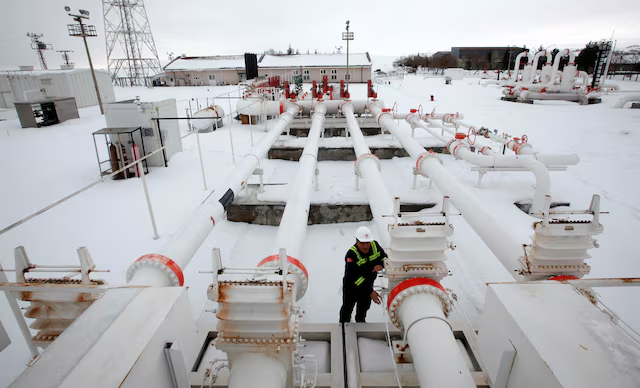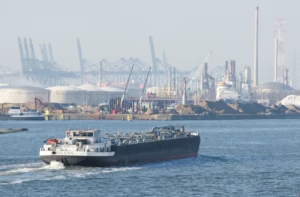Turkey’s Gas Shift Poses a Threat to Russia and Iran’s Last Major European Market

Turkey could meet more than half of its gas demand by 2028 through increased domestic production and a surge in U.S. imports — a transformation that threatens to shrink one of Russia and Iran’s last major energy markets in Europe.
Washington has been pressing its NATO ally to scale back energy ties with Moscow and Tehran. During a meeting at the White House on September 25, U.S. President Donald Trump urged Turkish President Tayyip Erdoğan to cut purchases of Russian gas.
Diversifying supply would not only strengthen Turkey’s energy security but also advance its ambitions to become a regional gas hub. Analysts say Ankara aims to import and re-export U.S. liquefied natural gas (LNG) and domestic gas to Europe, while limiting Russian and Iranian gas for local consumption.
“Turkey is signaling that it intends to take advantage of the global LNG glut,” said Sohbet Karbuz of the Paris-based Mediterranean Energy and Climate Organization.
Russia’s market share dwindles
Russia remains Turkey’s largest gas supplier, but its market share has dropped from around 60% two decades ago to 37% in the first half of 2025, after many European countries halted imports following Moscow’s invasion of Ukraine in 2022.
Russia’s long-term pipeline contracts — supplying about 22 billion cubic meters (bcm) annually through the Blue Stream and TurkStream pipelines — are nearing expiration. Iran’s 10 bcm contract expires in mid-2026, while Azerbaijan’s agreements, totaling 9.5 bcm, run through 2030 and 2033.
Karbuz said Ankara is likely to renew some contracts but under more flexible terms and reduced volumes as it diversifies its supply base.
Domestic output and U.S. imports on the rise
Turkey is rapidly expanding alternative sources. State energy firm TPAO is boosting output from domestic fields, while both state and private companies are enlarging LNG terminals to import gas from the U.S. and Algeria.
According to Reuters estimates, domestic production and contracted LNG imports are set to rise from 15 bcm this year to 26 bcm annually by 2028.
That would cover more than half of Turkey’s projected 53 bcm demand, cutting pipeline imports to around 26 bcm — far below the current combined 41 bcm supplied by Russia, Iran, and Azerbaijan.
To support this transition, Turkey has signed several long-term LNG deals worth $43 billion with U.S. suppliers, including a 20-year agreement with Mercuria in September.
The country has built LNG import capacity of 58 bcm per year, enough to meet its entire domestic demand, according to the Turkish Energy Exchange.
Russia’s grip loosens — but remains significant
Despite the shift, Russian gas continues to flow at full capacity, and the Kremlin insists cooperation remains strong.
Alexei Belogoryev of Moscow’s Institute for Energy and Finance said that while Turkey may not need as much Russian gas, BOTAS — Turkey’s state pipeline company — is unlikely to halt imports in the next few years.
“In theory, BOTAS could stop importing from Moscow within two or three years,” Belogoryev said. “But it won’t, because Russian gas remains competitively priced and gives BOTAS leverage when negotiating with other suppliers.”
Energy Minister Alparslan Bayraktar said in an October TV interview that Turkey should source gas from all available suppliers — including Russia, Iran, and Azerbaijan — but noted that U.S. LNG offers cheaper alternatives.
The Energy Ministry declined to comment on future contracts or pricing. Gazprom (GAZP.MM), Russia’s pipeline export monopoly, did not respond to a request for comment.
A growing regional gas hub
Karbuz added that with Europe planning to end Russian energy imports by 2028, Turkey could consume Russian and Iranian gas domestically, export its own production, and re-export imported LNG.
BOTAS has already signed agreements to supply small volumes of gas to Hungary and Romania, part of Ankara’s push to become a regional gas trading hub.
Beyond gas, Ankara maintains deep energy ties with Moscow: Russia’s Rosatom is building Turkey’s first nuclear power plant, while Russia also remains a key supplier of crude oil and diesel.

Continuing the achievement of the journey of effectiveness and credibility of more than 10 years in the career of journalism, as a woman journalist, I am Serving as the founder, promoter and editor of DiaryTimes with the trust and support of all. My credible coverage may not have given a big shape to the numbers, but my journey presents articles that make you aware of the exact and meaningful situations of Himachal’s politics, ground issues related to the public, business, tourism and the difficult geographical conditions of the state and financial awareness. DiaryTimes, full of the experience of my precise editorial expertise, is awakening the flame of credible journalism among all of you, so that the eternal flame of meaningful change can be lit in the life of the people of the state and the atrocities being committed against the people can be brought to the fore, I am motivated for that. If even a small change comes with the power of my journalism and the whole world becomes a witness to that issues, then I will consider myself fortunate.





